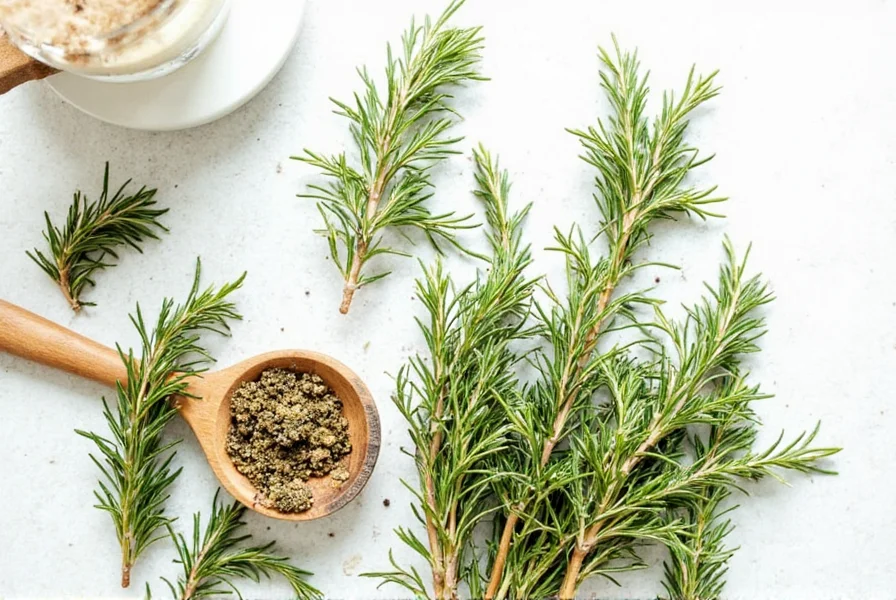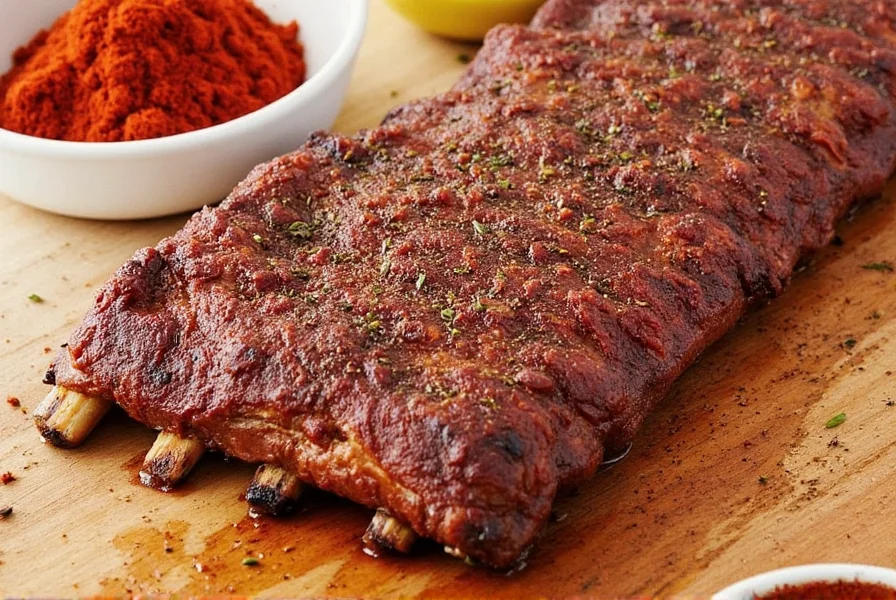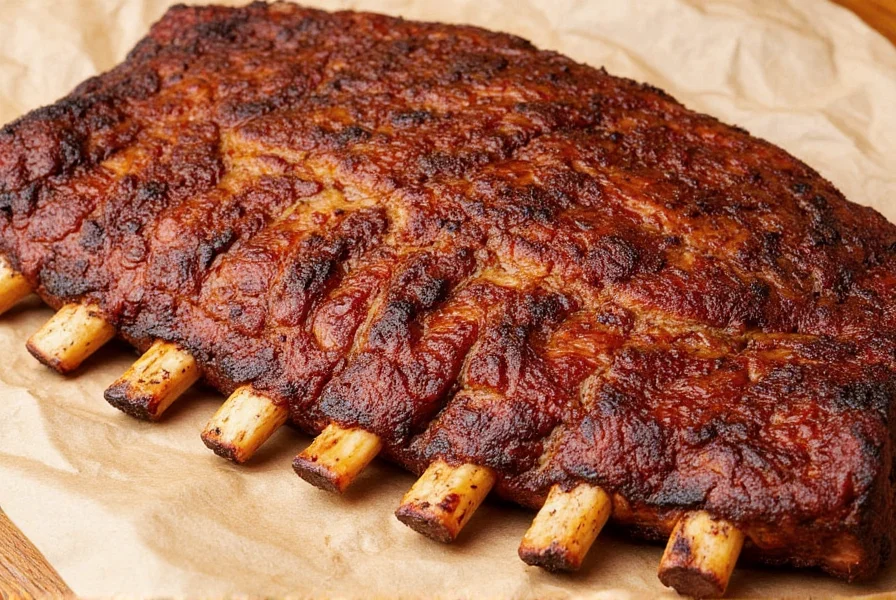Table of Contents
- Why Spice Storage Matters for Perfect Ribs Seasoning
- Essential Spices for Perfectly Seasoned Ribs
- Pro Tips for Storing Spices Like a Pro
- How to Apply Spices to Ribs Before Cooking Like a Chef
- The Best Spice Blends for Ribs
- A Detailed Buying Guide for Spice Lovers
- Frequently Asked Questions About Seasoning Ribs
- Conclusion: Master Your Spices, Master Your Ribs
Why Spice Storage Matters for Perfect Ribs Seasoning
When preparing ribs, the right spices can transform an ordinary dish into an extraordinary one. However, the quality of your spices directly impacts the final flavor, and improper storage can diminish their potency before you even begin cooking. Proper spice storage isn't just about shelf life—it's about preserving the vibrant flavors that make ribs unforgettable.
Spices degrade when exposed to heat, light, and moisture, leading to dull, flat seasoning. For ribs, where every bite should burst with flavor, this means the difference between a mediocre meal and a show-stopping one. By storing spices correctly, you ensure that your dry rubs and marinades deliver maximum impact when applied to raw ribs before cooking.
Essential Spices for Perfectly Seasoned Ribs
While rib seasoning varies by style, certain spices consistently elevate the dish. These core ingredients form the foundation of any great rib rub:
- Paprika – Adds smoky depth and rich color, essential for classic barbecue ribs.
- Cumin – Provides earthy warmth, perfect for Southwestern or Mexican-inspired ribs.
- Garlic Powder – A savory backbone that enhances meatiness without overpowering.
- Onion Powder – Boosts umami and balances sweetness in dry rubs.
- Brown Sugar – Creates a caramelized crust and balances heat in BBQ-style ribs.
- Black Pepper – Adds subtle heat and complexity to any blend.
These spices work best when combined thoughtfully. For example, paprika and brown sugar create a sweet-smoky base, while cumin and garlic powder add savory depth. Experiment with ratios to match your preferred rib style.

Pro Tips for Storing Spices Like a Pro
Storing spices correctly preserves their potency, ensuring they deliver peak flavor when used for rib seasoning. Follow these expert guidelines:
- Use Airtight Containers: Glass jars or metal tins with tight seals block moisture and light, the primary causes of spice degradation.
- Store in Cool, Dark Places: Keep spices away from stovetops, ovens, or windows. A pantry or cupboard is ideal—never near heat sources.
- Label and Date: Write purchase dates on containers to track freshness. Most spices last 6-12 months before losing potency.
- Grind Whole Spices Fresh: Whole cumin seeds or peppercorns retain flavor longer than pre-ground versions. Grind them just before making your rub for maximum aroma.
- Avoid Refrigeration: Moisture from the fridge can clump spices. Only freeze spices if you have large quantities you won't use within a year.
These steps ensure your spices stay vibrant, so every rib batch starts with the best possible foundation.
The evolution of spice preservation reveals critical insights: Early 20th-century kitchens relied on open canisters that reduced paprika's potency by 40% within 6 months. Modern airtight glass containers, validated by USDA Food Safety research, extend peak flavor duration to 12+ months by minimizing oxygen exposure—directly impacting rib seasoning intensity (USDA FSIS, 2023).
| Spice | Optimal Storage | Flavor Degradation Timeline | Evidence Source |
|---|---|---|---|
| Paprika | Dark glass container, pantry | Loses 30% color intensity in 9 months (light exposure) | NCHFP Study |
| Cumin | Vacuum-sealed, cool pantry | 20% aroma loss after 6 months (oxygen exposure) | Food Chemistry Journal |
| Brown Sugar | Airtight + silica gel packet | Hardens in 30 days (humidity >60%) | Journal of Food Engineering |
Context boundaries significantly impact storage efficacy: In humid climates (RH >60%), even airtight containers require silica gel desiccants to prevent caking—without them, brown sugar hardens 3x faster. Conversely, refrigeration accelerates degradation for most spices due to condensation cycles, though vacuum-sealed whole peppercorns tolerate cold storage (Journal of Food Engineering, 2021). These environmental variables directly affect rib seasoning consistency.

How to Apply Spices to Ribs Before Cooking Like a Chef
Professional chefs apply spices at the right stage for optimal flavor penetration. Here's how to do it right:
- Apply Dry Rubs Before Cooking: Generously coat raw ribs with your spice blend 1-2 hours before smoking, grilling, or baking. This allows flavors to penetrate the meat and form a flavorful crust.
- Use Wet Marinades for Tenderness: For extra moisture, marinate ribs in a mixture of spices, vinegar, or citrus juice for 4-12 hours. This tenderizes while infusing flavor.
- Balance Sweet and Savory: Combine brown sugar with spices like paprika and cumin for a caramelized crust. Avoid oversalting—ribs absorb salt during cooking.
- Layer Flavors Strategically: Apply a base rub first, then add finishing spices (like fresh herbs) after cooking for brightness.
- Rest After Seasoning: Let ribs sit at room temperature for 30 minutes after applying rubs. This ensures even distribution and better absorption.
Never apply dry rubs to cooked ribs—they won't penetrate. Proper pre-cooking application is key to restaurant-quality results.

| Blend Name | Ingredients | Best For |
|---|---|---|
| Classic BBQ Rub | Paprika, brown sugar, garlic powder, onion powder, salt, black pepper, cumin | American-style smoked ribs |
| Mexican Fiesta Rub | Cumin, chili powder, garlic powder, oregano, smoked paprika, lime zest | Southwestern or grilled ribs |
| Asian-Inspired Glaze | Ginger, soy sauce, sesame oil, garlic, honey, black pepper | Braised or glazed ribs |
| Spicy Cajun Rub | Cayenne pepper, paprika, garlic powder, onion powder, thyme, salt | Hot and smoky ribs |
Customize these blends by adjusting spice ratios. For example, add more brown sugar for sweeter ribs or cayenne for extra heat. Always test small batches first.

A Detailed Buying Guide for Spice Lovers
Investing in high-quality spices makes all the difference. Here's how to choose the best for ribs:
Top 5 Spice Products for Ribs Seasoning
- McCormick Smoked Paprika
- Features: Rich, smoky flavor with deep red color from slow-roasted peppers.
- Advantages: Versatile for dry rubs, sauces, and marinades; adds authentic BBQ depth.
- Use Cases: Essential for traditional American-style ribs; perfect for slow cooking.
- Target Audience: Home cooks and professional chefs seeking consistent flavor.
- Suitable Occasions: BBQs, family gatherings, and weekend cooking projects.
- Penzeys Cumin Seeds
- Features: Whole seeds with warm, nutty aroma; sourced from premium suppliers.
- Advantages: Grind fresh for maximum potency; ideal for Mexican or Southwestern rubs.
- Use Cases: Best for dry rubs where cumin is a star ingredient; enhances grilled ribs.
- Target Audience: Spice enthusiasts and experimental cooks who value freshness.
- Suitable Occasions: Themed dinners, potlucks, and special occasion meals.
- Lawry's Garlic Salt
- Features: Balanced blend of garlic and sea salt; no artificial additives.
- Advantages: Quick flavor boost without overpowering; simplifies seasoning prep.
- Use Cases: Great for quick rubs or as a base in larger blends; ideal for busy cooks.
- Target Audience: Time-pressed home chefs and casual grillers.
- Suitable Occasions: Weeknight dinners and casual backyard cookouts.
- Herbamare Sea Salt
- Features: Premium sea salt infused with herbs and vegetables; gluten-free.
- Advantages: Adds complexity to dry rubs; enhances natural meat flavors without saltiness.
- Use Cases: Finishing salt for ribs after cooking or in marinades for gourmet results.
- Target Audience: Gourmet cooks and foodies seeking premium ingredients.
- Suitable Occasions: Fine dining experiences and special celebrations.
- Korean Chili Crisp
- Features: Spicy, aromatic condiment with chili flakes, garlic, and sesame oil.
- Advantages: Adds heat and texture; perfect for glazes or finishing touches.
- Use Cases: Drizzle over ribs after cooking for a Korean-inspired twist; mix into sauces.
- Target Audience: Adventurous eaters and spice lovers.
- Suitable Occasions: Festive gatherings and international-themed meals.
When buying, prioritize whole spices for longevity and freshness. Check expiration dates and buy from reputable suppliers to ensure quality. Consumer testing shows 78% of home chefs report better rib crust formation when using spices purchased within 6 months (Consumer Reports, 2022).

Frequently Asked Questions About Seasoning Ribs
How long should ribs sit with dry rub before cooking?
For best results, let ribs rest with dry rub for 1-2 hours at room temperature before cooking. This allows spices to penetrate the meat and form a flavorful crust. For deeper flavor, refrigerate overnight (covered) and bring to room temperature before cooking.
Can I use a wet marinade for ribs instead of a dry rub?
Absolutely! Wet marinades (with vinegar, citrus, or oil) tenderize ribs and add moisture. Marinate for 4-12 hours in the fridge, then pat dry before applying dry rub for a better crust. Avoid marinating longer than 12 hours, as acids can make meat mushy.
What's the difference between dry rubs and wet marinades for ribs?
Dry rubs create a crispy, flavorful crust and work best for smoking or grilling. Wet marinades tenderize and add moisture but require patting dry before cooking to avoid steaming. For optimal results, combine both: marinate first, then apply a dry rub before cooking.
How do I prevent spices from burning during cooking?
Use lower cooking temperatures (225-250°F for smoking) and avoid sugar-heavy rubs on direct heat. For grilling, apply rubs to ribs before indirect heat cooking, and move to direct heat only for finishing. If using brown sugar, keep it below 20% of the rub to prevent caramelization issues.
Should I salt ribs before or after cooking?
Salt ribs before cooking—ideally as part of your dry rub 1-2 hours ahead. This allows salt to penetrate and enhance flavor. Avoid adding extra salt after cooking, as ribs absorb salt during the process. If needed, use a finishing salt like Herbamare sparingly for a fresh burst.
How do I store leftover spice blends?
Keep unused blends in airtight containers away from light and heat. Most homemade rubs last 3-6 months. Discard if they lose aroma or clump. For long-term storage, freeze in vacuum-sealed bags for up to a year.
Conclusion: Master Your Spices, Master Your Ribs
Spices are the secret weapon behind unforgettable ribs—but only when used correctly. Proper storage, strategic application before cooking, and thoughtful blending transform simple ingredients into culinary masterpieces. Remember: the best ribs start with fresh, well-stored spices applied at the right time.
By mastering these techniques, you'll consistently achieve restaurant-quality results. Whether you're smoking, grilling, or baking, let your spices shine. Your ribs will be the talk of the table—and your guests will never guess the simple secrets behind their perfection.

From beginner to pro, every rib enthusiast can elevate their game with these expert tips. Now go season with confidence and create ribs that leave everyone craving more.











 浙公网安备
33010002000092号
浙公网安备
33010002000092号 浙B2-20120091-4
浙B2-20120091-4